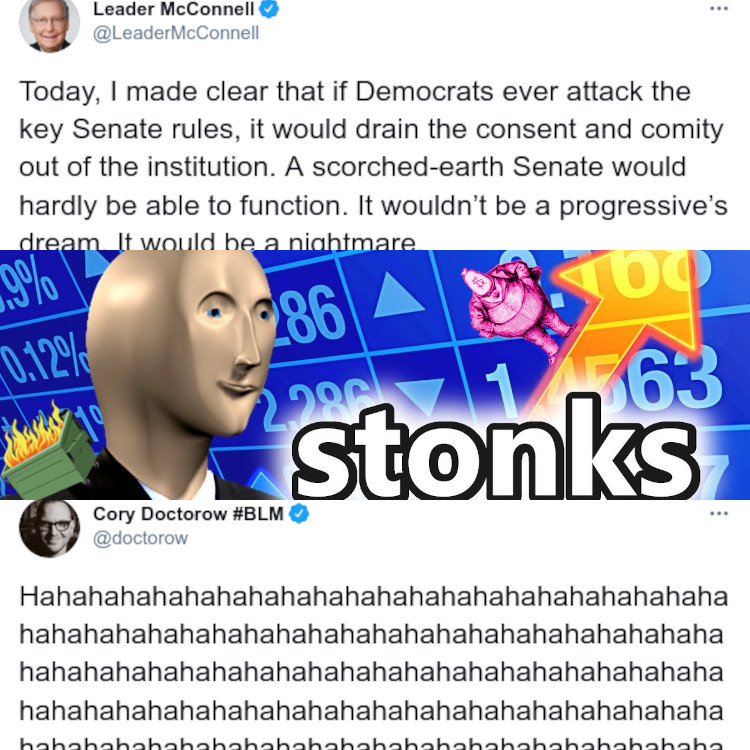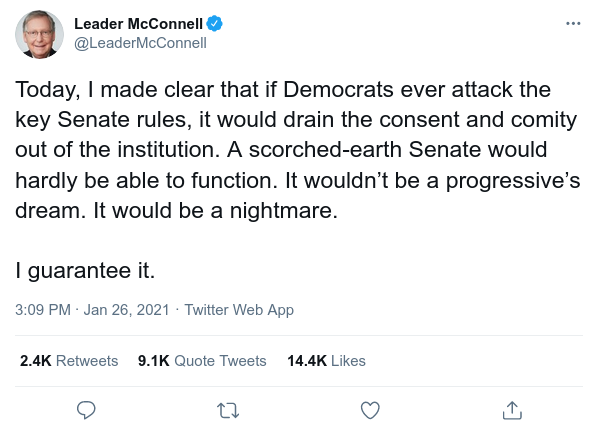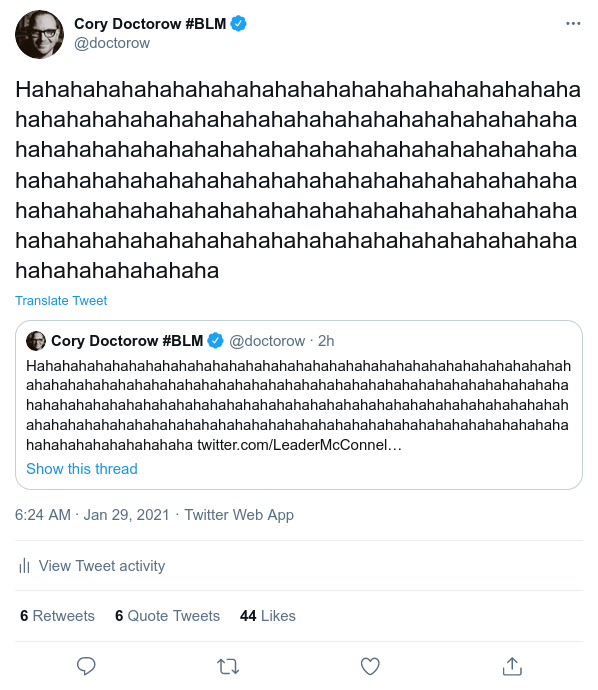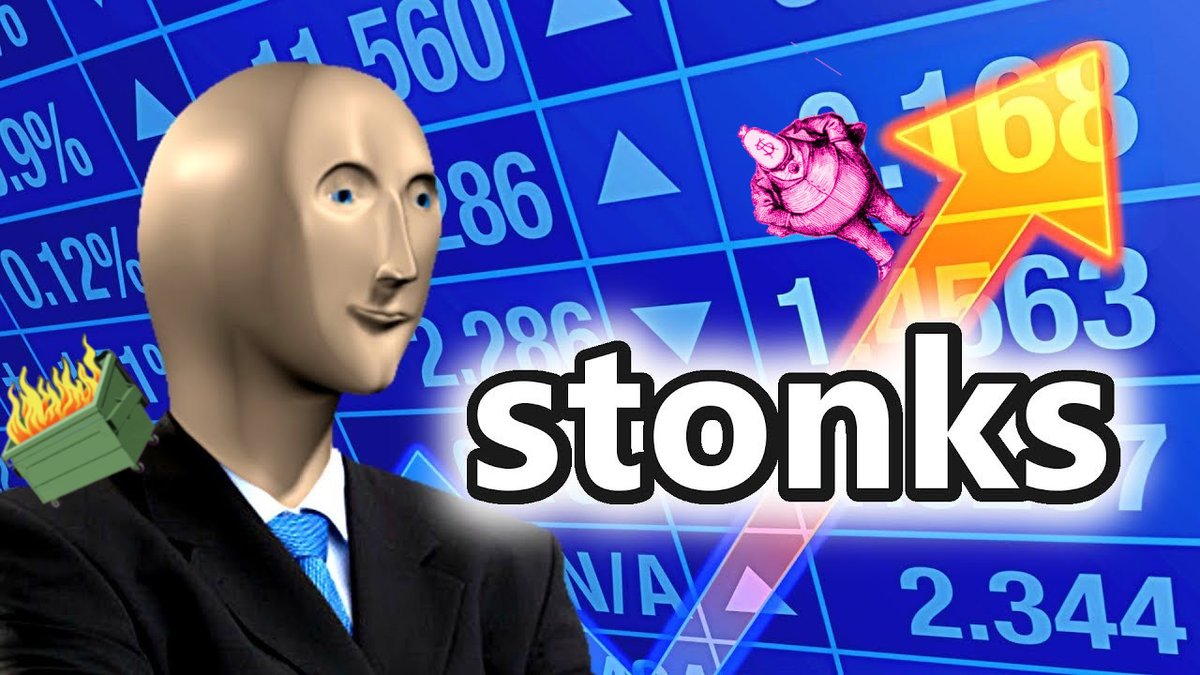
The world is beset by urgent, fantastically technical challenges - vaccine logistics, financial misconduct, geoengineering proposals and fights about what we should eat and how we should get from A to B.
1/
1/
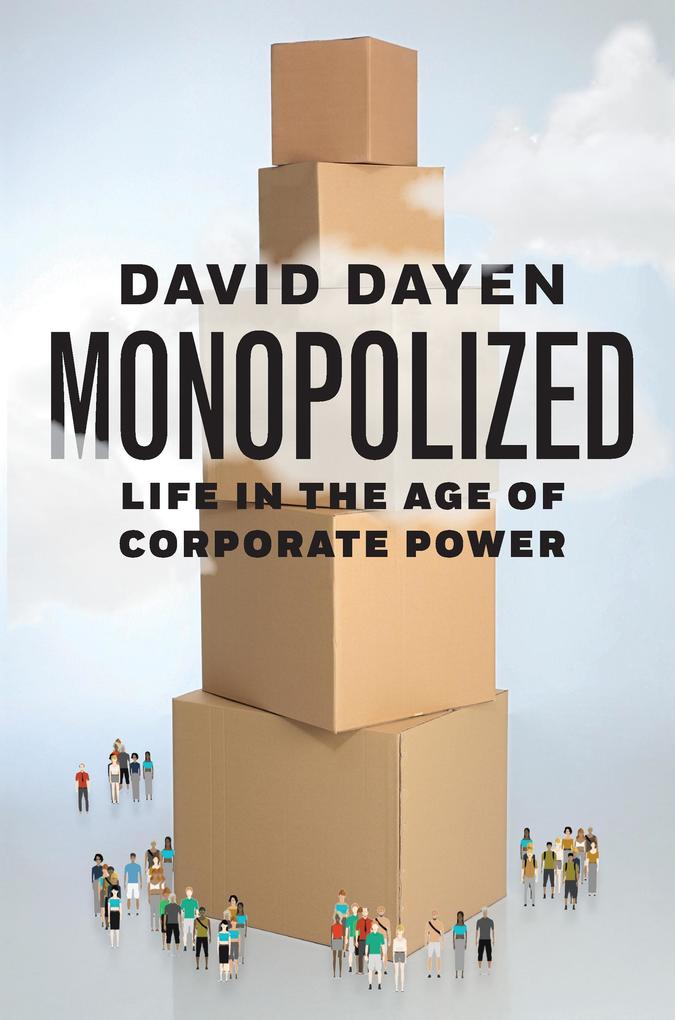
These are thorny problems. Getting them right is urgent - and hard. Not just because these are complicated questions, but also because there are powerful, monied people who benefit when we get them wrong, and they pay handsomely for doubt.
2/
2/
Worse: many of these problems involve far-off, probabilistic consequences for actions we're taking today: "If we don't do something about climate change, your grandkids will experience some bad stuff. Probably. Maybe not yours. Someone's though."
3/
3/
Add it all up - complexity, bad-faith doubt-sowers, and probabilistic, far-off consequences - and it's really hard to get people to treat these issues with the warranted gravity and urgency.
4/
4/
Authors who write books on these subjects use two main tactics:
I. Explainers: demystify a complex subject, breaking it down until it becomes legible to a lay audience, and
II. Storytelling: find people whose lives dramatize the technical issue and tell their stories.
5/
I. Explainers: demystify a complex subject, breaking it down until it becomes legible to a lay audience, and
II. Storytelling: find people whose lives dramatize the technical issue and tell their stories.
5/
This is a pretty good strategy. Get the balance right and the explainers become eye-opening jolts of recognition ("Oh, THAT'S why things are the way they are!") while the storytelling personalizes the new knowledge.
6/
6/
But both have their limits, especially when it comes to the monopolies of late-stage capitalism. The thing is, every grift in the monopoly playbook - evictions, CDOs, pharmacy benefit managers, ad-tech, patent trolling - is just bullshit.
7/
7/
These things aren't hard to understand because they're complicated. They're complicated so that they'll be hard to understand. The first time you unravel one, it's quite gratifying: "Oh, I'm not stupid, it's just all nonsense. Wow."
8/
8/
The fiftieth time, it's like, "God, not another one?"
It's like when I worked in a bookstore and hustlers would come in trying to cadge money from me by telling me long stories about buying bus tickets home to help an ailing relative.
9/
It's like when I worked in a bookstore and hustlers would come in trying to cadge money from me by telling me long stories about buying bus tickets home to help an ailing relative.
9/
The longer the story went on, the most obviously untrue it became. The experience goes from amusing to weird to tedious.
Listen long enough to the idiotic scams of Gwyneth Paltrow/Alex Jones or Reverse Factoring hustlers and your brains will start running out of your ears.
10/
Listen long enough to the idiotic scams of Gwyneth Paltrow/Alex Jones or Reverse Factoring hustlers and your brains will start running out of your ears.
10/
And there's a storytelling failure mode, too: focusing down on "characters" can make systemic problems seem like individual ones - like, if we just punish that racist bully, we're driving out racism itself.
11/
11/
Writing an effective activist book on these lines is an art, not a science: just enough explaining to make it clear how wicked and awful the bad guys are, just enough storytelling so we know what the consequences are.
12/
12/
Which brings me to @ddayen's MONOPOLIZED, a SUPERB book about the rise and rise of monopolies.
If telling this kind of complicated, technical story and making it personal and urgent is an art, then Dayen is an artist.
13/
If telling this kind of complicated, technical story and making it personal and urgent is an art, then Dayen is an artist.
13/
Chapter by chapter, Dayen weaves explainers and personal stories together, unpicking snarled knots of bullshit and laying them straight to reveal them for the turds they are; then showing how we're personally drowning in crap.
14/
14/
From pharma to aviation, airlines to newspapers, Big Tech to Big Funeral, Dayen's book connects together every one of the scams that picks our pockets, robs us of dignity and life chances, and laughs in our faces.
15/
15/
He shows how monopolists - and their court sorcerers from the Chicago School of economics - have spent 40 years telling us that we can't believe our own experience of the worsening, contracting world around us, that the models prove it's getting better.
16/
16/
He shows us how both reviled mega-CEOs like Jeff Bezos and cuddly "investors" like Warren Buffet are brutalizing workers, inventors, customers, travelers, prisoners, and everyone in between.
17/
17/
His technical breakdowns are flawlessly understandable and witty, too - and never lapse into the tedium of "not more of this bullshit, no," while the human stories are perfectly chosen to illustrate how these scams hurt real people.
18/
18/
Dayen doesn't just break down his subjects - he builds them back up again, illustrating, for example, how monopolies in pharma forced the hospitals to monopolize in self-defense, and THAT led to monopolies in insurance.
19/
19/
The point being that any monopolies lead to everything being monopolized - and that the only sector of the economy that doesn't get to band together under a single institution to push back is us, the public, the workers, the consumers.
20/
20/
In the year since this book was published, the problems have only gotten worse. I noted with irony as I finished the excellent audiobook that it was recorded by a company that became a division of a notorious private equity fund over that period.
21/
21/
Our new gilded age is coming apart at the seams. A transparently absurd doctrine that assured us that monopolies were "efficient" and would benefit us all has brought us to the brink of ruin.
22/
22/
MONOPOLIZED is the story of how we got here - who is to blame, what's really going on, and most importantly what we need to do to turn it all around.
eof/
eof/
• • •
Missing some Tweet in this thread? You can try to
force a refresh

